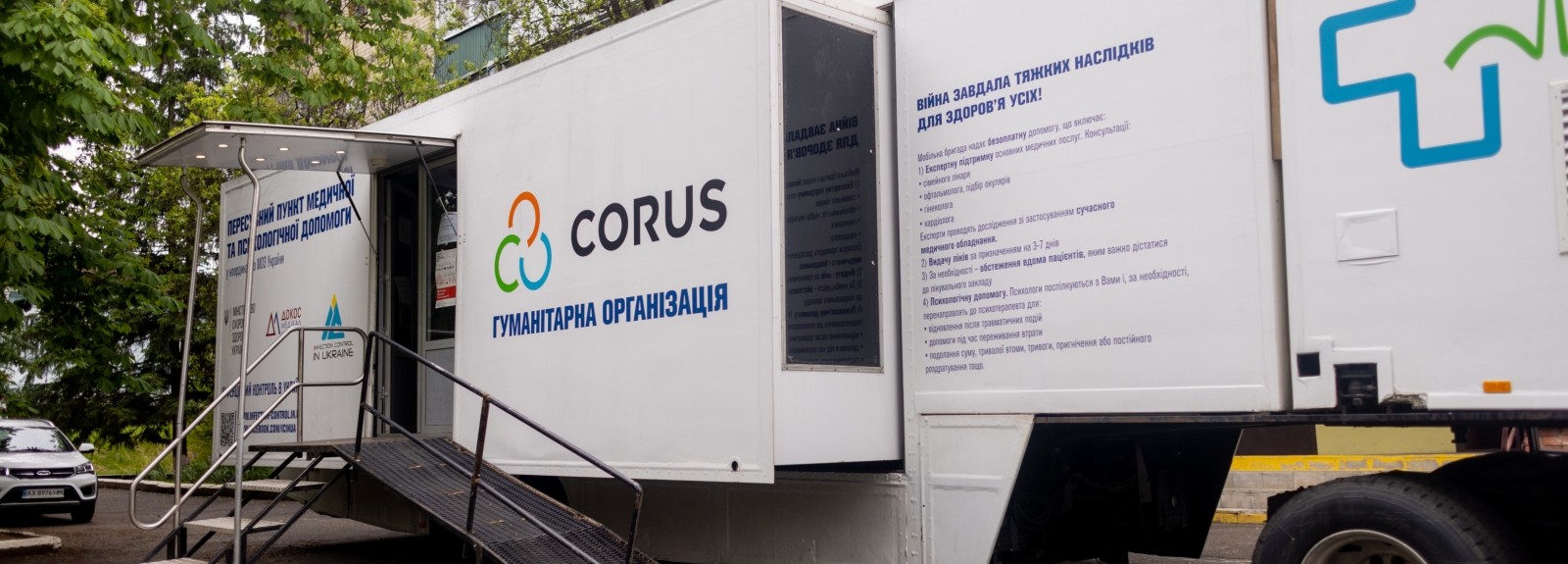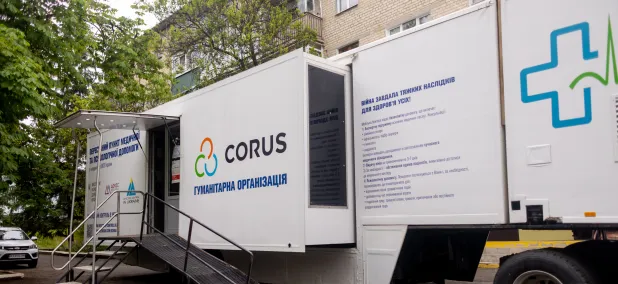A clinic that moves. Health apps that integrate with national-level systems.
What do the two have in common?
They are efficient, cost-effective solutions for delivering quality care to hard-to-reach communities — and both are highly valuable in emergency situations.
Corus International knows that the strongest health care systems must include large-scale mobile and digital solutions. That’s why we operate at the forefront of health care mobility and technology, paving the way toward more accessible and resilient health care systems.
MOBILE CLINICS
Delivering care where others can’t
Mobile clinics provide a crucial solution to the accessibility gap in health care. With efficiency, adaptability and rapid deployment in mind, these transportable stations are designed to bring essential medical services to communities that often lack permanent health facilities and workforce. Whether in remote rural villages or disaster or conflict zones, mobile clinics are equipped to overcome physical barriers and operate under difficult conditions to deliver lifesaving care.
Our expertise in action
Corus rapidly deployed a mobile clinic as part of our humanitarian response along the front lines of the war in Ukraine, where medical facilities were destroyed and personnel were gone. Corus and local partners equipped a large trailer and hired qualified Ukrainian health workers to travel to various locations across Chernihiv, Sumy, Kharkiv and Dnipropetrovsk to provide primary and specialized care, diagnostic and mental health services to the many who had no choice but to remain in these devastated areas.
To date, Corus’ mobile clinic in Ukraine has:
- Reached nearly 9,000 patients;
- Delivered over 32,000 medical services, including cardiology and ophthalmology procedures;
- Provided nearly 5,000 people with mental health support, and more than 2,000 women and children affected by violence with specialized mental health services.
Versatility across contexts
One of the most significant advantages of mobile clinics is their flexibility in both humanitarian and development settings. Rapidly deployable, these clinics adapt to the immediate needs of various populations. Whether addressing primary care requirements, administering maternal and child health services, conducting immunization drives, or even offering dental care, mobile clinics are configurable to meet a diverse array of health demands. Their ability to pivot between emergencies and routine care enhances their value across different scenarios.
Investment and integration
While mobile clinics offer unparalleled reach, their success requires a robust foundation of investment and integration. Initial setup involves procuring vehicles, medical equipment, and essential supplies. However, sustainability depends on embedding these mobile units within broader public health systems. Long-term integration ensures that mobile clinics operate not as standalone units but as vital components of a cohesive, community-centered healthcare strategy.
DIGITAL SOLUTIONS
Building resilience with digital innovations
Beyond physical mobility, the digital space offers another agile means of expanding the reach and improving functionality of health systems. At Corus, we have developed and implemented a range of digital tools designed to address critical humanitarian, development, and health challenges.
Our expertise in action
Our Empleando Mentes app connects young people in Honduras with livelihoods assistance and psychosocial support, while our HereMIS software bridges data gaps in education systems. The nature of these innovations allows them to be efficiently adapted to address new challenges in different, nuanced contexts.
Tailored to real-world health needs
Existing Corus digital solutions are available to be tailored and curated into a collection of apps that tackle vital areas of health care, such as:
- Providing psychosocial support;
- Enabling pandemic preparedness through early warning and response systems;
- Streamlining hospital operations with management information systems (MIS);
- Enhancing workforce management using Human Resources for Health Information Systems (HRHIS).
Collectively, they would enable a comprehensive approach to improving health care processes and outcomes.
Scalable and interoperable by design
What sets these digital solutions apart are their adaptability and focus on interoperability. Each application is crafted using open standards, ensuring seamless integration with existing health systems and allowing for future scalability. This future-proof design supports long-term efficacy, aligning with the technological evolution of the health sector.
The path to implementation
Introducing these types of digital health solutions requires meaningful investment. Each app must be tailored to align with specific regulatory, infrastructural, and policy environments. Beyond technical adaptation, it is critical to generate demand and build user capacity, ensuring these solutions can achieve their intended impact. Equipping health care professionals and stakeholders with the knowledge and tools to effectively utilize these platforms is also a fundamental step toward lasting integration.
Synergy for health systems strengthening
Together, mobile clinics and digital health solutions provide a dual-pronged approach to addressing the multifaceted issues facing global health systems. By combining the physical reach of mobile clinics with the strategic foresight of digital tools, health care delivery becomes more accessible, adaptable, and resilient. These solutions not only address immediate gaps but also lay the groundwork for sustainable, equitable health systems capable of responding to future challenges.
Investing in these innovative approaches is not merely a choice but a necessity to build a healthier, more prosperous world. Governments, NGOs, and private sector stakeholders must collaborate to scale these solutions and ensure their integration into public health strategies. By prioritizing mobility and digital innovation, we can redefine what’s possible in global health systems.
The Corus Effect
Corus International is an international development organization that unites an array of nonprofit organizations and businesses, each with specialized expertise — from health to technology to economic development to emergency response. Alongside communities and local partners in fragile settings, our expert teams integrate disciplines, approaches and resources to overcome poverty and suffering for those living in the world’s toughest and most difficult circumstances. Our traditional and nontraditional approaches bring together the multi-dimensional, holistic solutions needed to truly achieve lasting change.
Corus features global public health leader IMA World Health, international development and aid organization Lutheran World Relief, technology for development consultancy CGA Technologies, impact investing firm Ground Up Investing, and direct-trade company Farmers Market Brands.


